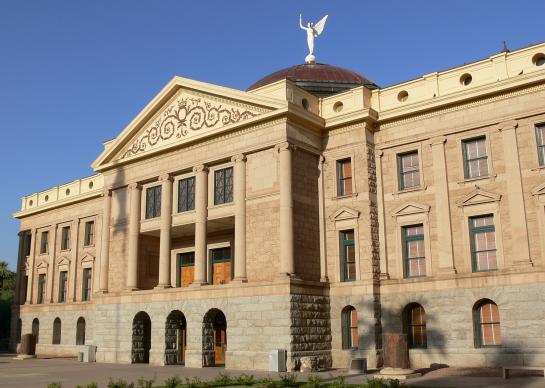AZ Legislative Update 04-08-2022

The legislative session crept along at a snail’s pace this week, slowed by legislators’ absences and the closed-door quest for agreement on a state budget or tax cuts. House and Senate Republicans are still trying to broker a deal that will reenact an income tax cut and add new funding for education. They’re also hoping to find a compromise on Governor Ducey’s proposed new water agency. If legislative leaders find enough votes for either effort, the Governor could call a special session to advance the legislation.
This week’s House and Senate floor sessions were brief and mostly quiet. The Senate sidelined a bill to give the Arizona Office of Tourism more authority and narrowly approved a bill to require schools to designate a moment of silence each day, but most bills passed with strong bipartisan support.
The House advanced proposals that add new requirements for auto glass repair, give schools more flexibility over how students spend their instructional time, and require a study on the use of off-highway vehicles in Arizona.
The Senate voted to waive opioid prescription limits for some patients, tell HOAs they cannot ban political signs, permit counties to work with other governments to increase water supplies, and allow more Purple Heart recipients to qualify for free tuition.
The House and Senate wrapped up the week with a joint session to hear from Dmytro Kushneruk, a Consul General of Ukraine.
Arizona’s New Laws
Governor Ducey signed 12 bills this week – including proposals to alter how religious beliefs affect adoption processes, establish civil liability for someone who knowingly harms an individual with intimate images, and bar individuals convicted of cruelty to animals from having pets.
This year, the Governor has signed 118 bills; he has not vetoed any.
What’s Next?
The slow progress at the Capitol is likely to continue until lawmakers have a budget or the Governor calls a special legislative session. Legislators still have more than 400 bills to consider in the regular legislative session – including changes to the regulation of short-term rental houses and a rewrite of Arizona’s education funding formulas.
Candidates Start the Competition for Legislative Seats
This week, political hopefuls around the state filed the voter signatures necessary to run for office in the 2022 election cycle. A total of 210 people will compete for 90 seats in the state legislature. (The number of candidates could change: Write-in candidates can still collect signatures to add their names to the ballot, and some candidates may get bumped off the ballot if they don’t have enough valid signatures.)
The candidate list highlights some important factors for this election cycle:
- For some legislators, the election is just a formality.
Eleven current legislators – four Democrats and seven Republicans – are unopposed in their quest for another term in office.
- For some legislators, the legislative session is the campaign trail.
In five legislative districts, current legislators are vying against each other for another term in office. That means 12 lawmakers are running against a current colleague – often a member of their own political party. Those races will impact the rest of the legislative session as lawmakers consider political calculations behind high-profile votes and debates.
- For some, the legislature still has an appeal.
Ten former lawmakers hope to return to the Capitol next year – eight Republicans and two Democrats. Some left the legislature after many years of service there; others’ political careers were cut short by election losses. Now they want another chance to make their mark on state policies. Many of them are running against sitting legislators of their own party – further evidence of the fractures that exist within the political parties.
- Political parties still have power.
While a growing number of Arizona voters leave political parties to register as independent voters, almost all legislative candidates pursue office under the label of “Democrat” or “Republican.” Just two legislative candidates qualified for the ballot outside those parties: One Independent and one Libertarian. (Another Independent collected enough signatures to run for Congress.)
- There will be a lot of new faces at the Capitol next year.
Fifteen current lawmakers are not running, and competitions between legislators will force another five to leave office if they lose in the August primary election. Other legislators face tough election challenges that could threaten their chances for another term.
This election is important to the makeup of Arizona’s legislature and the policies it enacts. Click here to register to vote or check your voter registration, click here to find your district, and click here to learn more about the candidates.
In the Elections
The Arizona Attorney General issued an interim report about his investigation into the 2020 general election; Maricopa County officials said the report does not provide any examples of problems. Here’s why some Americans want to hand-count all ballots. Election workers are important.
In the Courts
The Arizona Supreme Court won’t fast-track the Arizona Republican Party’s efforts to end early voting. The Attorney General’s legal fight against university building projects can move forward.
In the News
The federal government believes that state laws limiting access to medical procedures for transgender children violate federal laws. Arizona’s debates about abortion and rural water management aren’t over. There are multiple reasons state legislators haven’t gotten a raise. Arizona’s not the only state looking for ways to prevent fentanyl deaths. The state’s tech sector keeps growing.